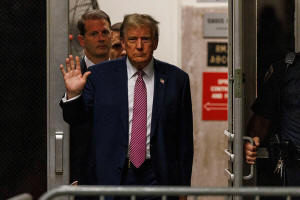Trump trial illustrates jury challenges in the social media age
 Send a link to a friend
Send a link to a friend
 [April 22, 2024]
By Jody Godoy [April 22, 2024]
By Jody Godoy
NEW YORK (Reuters) - Donald Trump's criminal trial in New York has
barely begun but one of the highest-profile court cases in U.S. history
has already highlighted the challenges of insulating a jury from social
media.
As opening statements are set to begin in New York on Monday, the
salacious case involving a hush-money payment to a porn star -- the
first criminal trial of a former U.S. president -- will test the limits
of what a judge can control.
To keep the trial fair and jurors safe from intimidation or influence
schemes, the court aims to maintain the secrecy of their identities,
shield them from online attacks and ensure they are not swayed by
coverage and social media comments.
But Justice Juan Merchan has virtually no ability to police what is
posted by most users on social media. According to
Pew Research in 2023, 90% of U.S. adults own smartphones, and the same
percentage say they are online every day.
"In some ways the social media aspect of the case makes those concerns
even more serious," Manhattan criminal defense attorney Michael Bachner
said.
Trump has millions of online followers, and some were behind death
threats to election workers after he lost the White House in 2020.
Merchan sought to keep prospective jurors' identities concealed during
jury selection. Their names were not disclosed except to Trump, his
lawyers and prosecutors.
Merchan soon prohibited media outlets from reporting the potential
jurors' employment after excusing a juror who said she felt intimidated
because some personal details were made public.

One person whose online speech Merchan believes he should be able to
control is the defendant himself. He has ordered Trump not to make
public statements about jurors, prosecutors and court staff or their
families, though he is free to air his thoughts on the judge and
district attorney.
Prosecutors have accused Trump of violating the order multiple times,
including in a Truth Social post on the jury pool. "They are catching
undercover Liberal Activists lying to the Judge in order to get on the
Trump Jury," Trump posted.
Merchan has scheduled a Tuesday hearing on those claims. Trump has said
it would be an "honor" to be jailed for violating the order.
[to top of second column]
|

Former U.S. President and current Republican presidential candidate
Donald Trump enters his trial after a lunch break at Manhattan
Criminal Court in New York, New York, USA, 19 April 2024. Trump is
facing 34 felony counts of falsifying business records related to
payments made to adult film star Stormy Daniels during his 2016
presidential campaign. SARAH YENESEL/Pool via REUTERS/File Photo

AVOIDING COVERAGE
As the trial progresses, jurors also must try to comply with a court
order to avoid coverage of the case, including on social media and
mobile devices.
"To be honest, my generation is on social media a lot," one
potential juror told Merchan. "So, if I'm scrolling, I usually see
it." But she assured the judge that she could avoid reading
headlines about the case that popped up on her phone.
In a recent civil case involving former Republican vice presidential
candidate Sarah Palin, jurors learned of a decision by the judge to
dismiss the case from news alerts.
Christina Marinakis, chief executive at trial consulting firm
Immersion Legal, said the barrage of headlines and social media
notifications on jurors' phones has been a huge problem in her
cases.
"This is another reason we have alternates, because somebody is
going to see something during the course of the trial that may cause
them to get dismissed," she said.
Six alternate jurors were selected for the Trump criminal trial.
The court could turn to a tactic most famously used in trials of
organized crime figures to prevent jury tampering: sequestering
jurors.
While technically an option in this case, it's not one judges invoke
lightly given the extreme disruption it would mean for jurors to
live in a hotel under court supervision.
"It's kind of a dire thing to do. You have to really have a good
reason to do it," Bachner said.
(Reporting by Jody Godoy in New York; editing by Tom Hals and
Cynthia Osterman)
[© 2024 Thomson Reuters. All rights reserved.]This material
may not be published, broadcast, rewritten or redistributed.
Thompson Reuters is solely responsible for this content. |